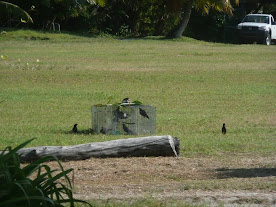The 25th of June was a very exciting day for Denis Island and the national programme for magpie robin conservation as 20 birds – nearly an eighth of the world population - were brought to the island.
This marks the next step in a long term project started by BirdLife International and now led by Nature Seychelles supported by a team of stakeholders including representatives of Government and the islands where populations of magpie robin already exist.
I was fortunate enough along with Spencer Collins, a captive bird management specialist from the Durrell Institute, to be on the chartered Air Seychelles STOL Twin Otter that took off from Mahe that morning at around 10:00hrs. The plane first flew to Fregate island where we were met by Gary Ward (Durrell Institute) and Phillipa Shultz (veterinarian) and 16 magpie robins already prepared in their transfer boxes.
With the birds safely secured, each box seat-belted in, the plane then took off and headed for Praslin airport where on arrival four more birds - that had been boated over from Cousin island that morning - were also collected before the plane continued to Denis island.
It was an amazing experience to take off from Praslin surrounded by close to an eighth of the total world population of this rare bird, including one in its box on my lap as the plane was now full.
On landing we were met by island staff and Jon Dale of Nature Seychelles who had been busily overseeing the construction of the aviaries on the island. The birds were carefully transferred to the waiting golf carts with just time for a photo of the dedicated transfer team, along side their precious cargo, before the birds were transferred to the aviaries. Five spacious aviaries had been prepared on the island each with two compartments. The birds were then released as per their pre-existing pairings, one pair to each compartment. The expert eyes of the transfer team assessed the condition of each bird whilst they were also immediately provided with food and water.
Obviously such a transfer is a stressful procedure for the birds and they had been carefully kept in captivity in aviaries on their source islands for several days prior to the transfer to ensure all birds were healthy and of a good weight prior to the move.
On release the birds were in remarkably good condition with bright eyes and glossy plumage and they promptly partook of the food and water provided – within a couple of hours loud singing could be heard from the aviaries.
The aviaries are positioned in five separate locations around Denis in suitable forest habitat. Over the next 2-3 weeks they will be maintained and monitored in the aviaries to make sure all birds have made the transition successfully. The aviary doors will then be opened allowing the birds to come and go as they please. Spencer Collins will remain on the island for a month, ably assisted by GIF’s Environmental Officer, Catherina Onezia. After Spencer’s departure Catherina will continue to monitor the birds over the coming year and maintain their supplementary feeding regime. Supplementary feeding will be gradually reduced over the next three years to allow the birds a structured and stable transition to full self sufficiency in their new home.
This transfer represents a major breakthrough in the implementation of the magpie robin conservation programme particularly when one considers that the world population was at one point reported to be as low as just 12 birds restricted to the island of Fregate. The introduction of 20 birds to Denis on the 25th June is a testament to the commitment and achievement of the dedicated staff of BirdLife International, Nature Seychelles and their local partners.
The Green Islands Foundation and Denis Island are proud to now form part of this team and national conservation effort.
Check back to this page for periodic updates on the progress of the birds.
Subscribe to:
Post Comments (Atom)

























1 comment:
I can't wait to read your next update on the magpie robins.
Post a Comment